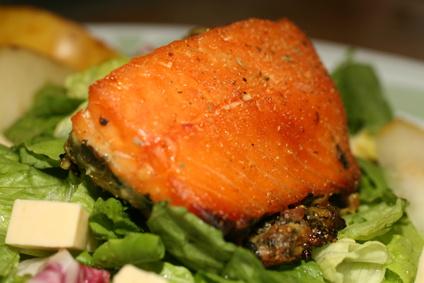While you can’t control the cholesterol your body naturally produces, you can control the amount of cholesterol you add to your body by the foods you eat. Not all cholesterol is bad for you. HDL, or good cholesterol, is like “the garbage truck of the bloodstream,” because it carries cholesterol away from your arteries and back to the liver for disposal, according to the Harvard School of Public Health. Bad cholesterol, or LDL, carries cholesterol from the liver to the rest of your body. Too much of it creates plaque, which clogs the arteries and limits blood flow. When the plaque breaks apart, you can suffer a heart attack or a stroke.
Fat to Stay Away From
What’s important to note about what you eat to maintain a healthy cholesterol level is not the total amount of fat you consume, but the type of fat you eat, according to the Harvard School of Public Health. The best thing you can do to improve your cholesterol level is to eliminate trans fats from your diet.
Trans Fats
Trans fats are short for trans fatty acids. Trans fats may be good in helping foods retain a longer shelf life, but they do nothing to help prolong yours. Trans fats can raise heart disease risk by increasing LDL cholesterol and decreasing HDL cholesterol, according to the Harvard School of Public Health. Invented in 1903 and sold to the public during two world wars and the depression in order to be economical, trans fats have cost Americans much more in terms of cardiovascular disease, medical costs, pain, suffering and lost productivity. No inkling that trans fats were bad for people existed until 1957. It took until 2006 for the United States to label any trans fats in packaged foods. You will find trans fats in commercially prepared baked goods, margarines, processed foods, snack foods, French fries and other fried foods prepared in restaurants and fast-food places.
Substitutes
After eliminating trans fats, you need to replace them with something. Soluble fiber foods are a good choice. You can eat oatmeal or oat bran, kidney beans, apples, pears, prunes and barley to get soluble fibers. Eating 10 g of soluble fiber a day can help decrease your LDL and overall cholesterol levels, according to the Mayo Clinic. Nuts are also a great way to reduce dietary cholesterol. Walnuts, almonds, hazelnuts, peanuts, pecans, pine nuts and pistachio nuts are all good choices. Just eat about a handful, though, because nuts are high in calories, and weight gain puts you at risk again for heart disease. Olive oil is good to use when cooking or in your salad dressing. Use about 2 tbsp. of olive oil a day to get its benefits. Extra-virgin olive oil is better because it is less processed.
Omega-3
Foods with Omega-3 fatty acids are good for your cholesterol level, too. Fatty fish and fish oil contain Omega-3 fatty acids. Eat at least two servings of fish a week, the Mayo Clinic recommends. The best fish for Omega-3 are salmon, albacore tuna, lake trout, mackerel, herring and sardines. Bake or grill it for the best results. If you are not a fish eater, you can get Omega-3 fatty acid from ground flaxseed or canola oil or by taking a fish oil supplement.
Fortified Foods
If your LDL cholesterol is more than 160 mg, you might want to eat foods that are fortified with sterols or stanols, substances that are in plants, the Mayo Clinic says. You can get margarines, orange juice and yogurt drinks that have been fortified with plant sterols.
Photo Credit
- salmon image by cherie from Fotolia.com





